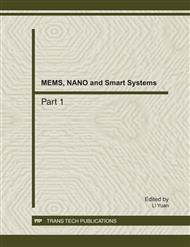[1]
R. V. Kulkarni, A Forster and G. K. Venayagamoorthy, Computational Intelligence in Wireless Sensor Networks : A Survey, IEEE Communications Surveys & Tutorials, 2010. DOI 10. 1109/SURV. 2011. 040310. 00002.
DOI: 10.1109/surv.2011.040310.00002
Google Scholar
[2]
N. Takahashi, I. Yamada and A. H. Sayed, Diffusion least-mean squares with adaptive combiners : Formulation and performance analysis, IEEE Trans. On Signal Processing, vol. 58, no. 9, pp.4795-4810, September (2010).
DOI: 10.1109/tsp.2010.2051429
Google Scholar
[3]
C. G. Lopes and A. H. Sayed, Incremental adaptive strategies over distributed networks, IEEE Trans. On Signal Processing, vol. 55, no. 8, pp.4064-4077, August (2007).
DOI: 10.1109/tsp.2007.896034
Google Scholar
[4]
B. Majhi, G. Panda and B. Mulgrew, Nonlinear identification over adaptive networks using distributed PSO algorithms, IEEE Congress on Evolutionary Computation (CEC 2009), Norway, 18-21 May 2009, p.2076-(2082).
DOI: 10.1109/cec.2009.4983197
Google Scholar
[5]
M. A. Montes de Oca, T. Stutzle, K Van den Enden and M. Dorigo, Incremental social learning in particle swarms, IEEE Trans. On Systems, Man and Cybernetics – Part B: Cybernetics, 2010. DOI 10. 1109/TSMCB. 2010. 2055848.
DOI: 10.1109/tsmcb.2010.2055848
Google Scholar
[6]
F. S. Cattivelli, C. G. Lopes and A. H. Sayed, Diffusion recursive least-squares for distributed estimation over adaptive networks, IEEE Trans. On Signal Processing, vol. 56, no. 5, pp.1865-1877, May (2008).
DOI: 10.1109/tsp.2007.913164
Google Scholar
[7]
P. R. Wilson, J. N. Ross and A. D. Brown, Optimizing the Jiles Atherton model of hysteresis by a genetic algorithm, IEEE Trans. Magn., vol. 37, no. 2, pp.989-993, March (2001).
DOI: 10.1109/20.917182
Google Scholar
[8]
M. Toman, G. Stumberger and D. Dolinar, Parameter identification of the Jiles-Atherton hysteresis model using differential evolution, IEEE Trans. On Magnetics, vol. 44, no. 6 pp.1098-1101, June (2008).
DOI: 10.1109/tmag.2007.915947
Google Scholar
[9]
R. Storn and K. Price, Differential evolution-a simple and efficient adaptive scheme for global optimization over continuous spaces, Int. Comput. Sci. Inst. (ICSI), Berkeley, CA, tech. Rep. TR-95-012, March (1995).
Google Scholar
[10]
R. Majhi, B. Majhi, M. K. Mishra and G. Panda, Retail sales forecasting using differential evolution, IEEE Int. Conference on Nature and Biologically Inspired Computig (NaBIC 09), Coimbatore, 9-11 Dec. 2009, pp.1343-1348.
DOI: 10.1109/nabic.2009.5393740
Google Scholar


